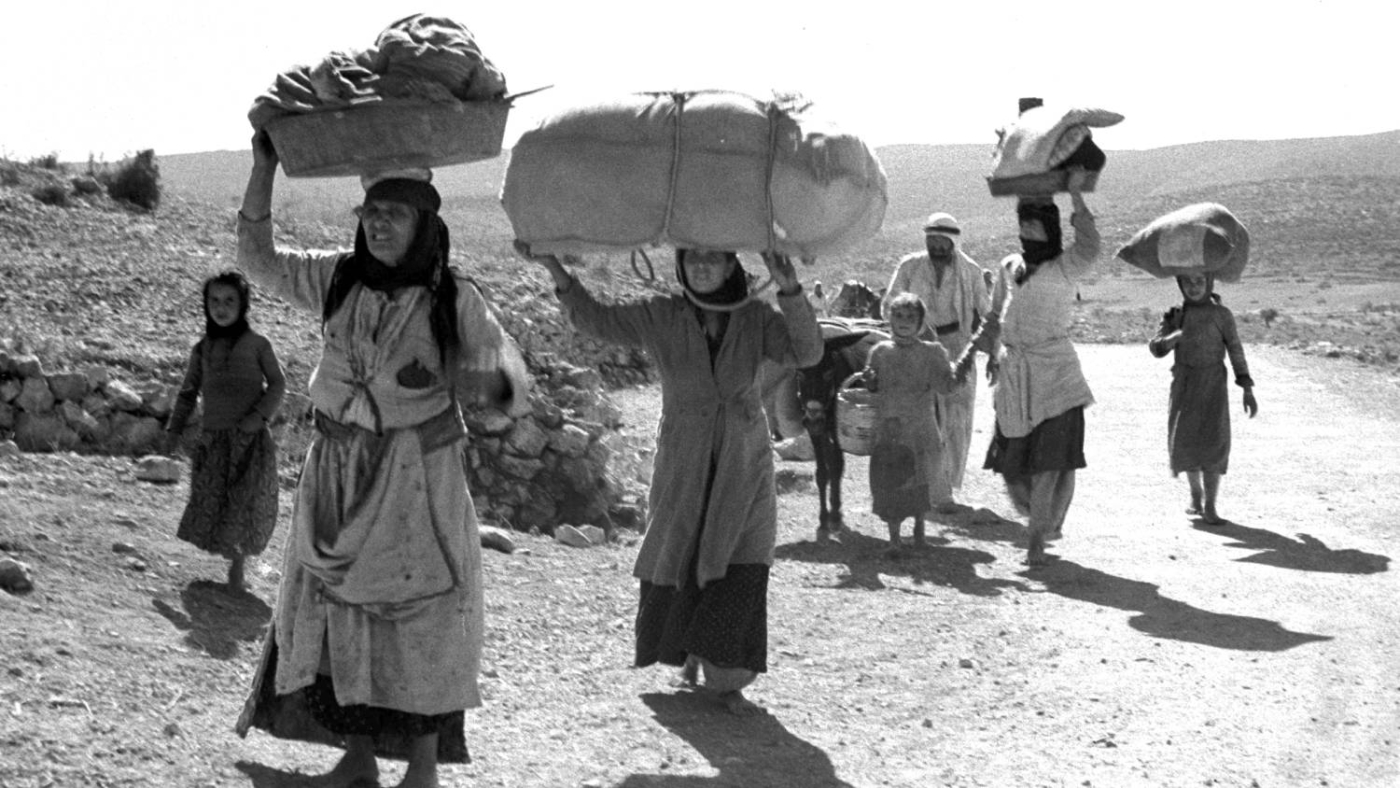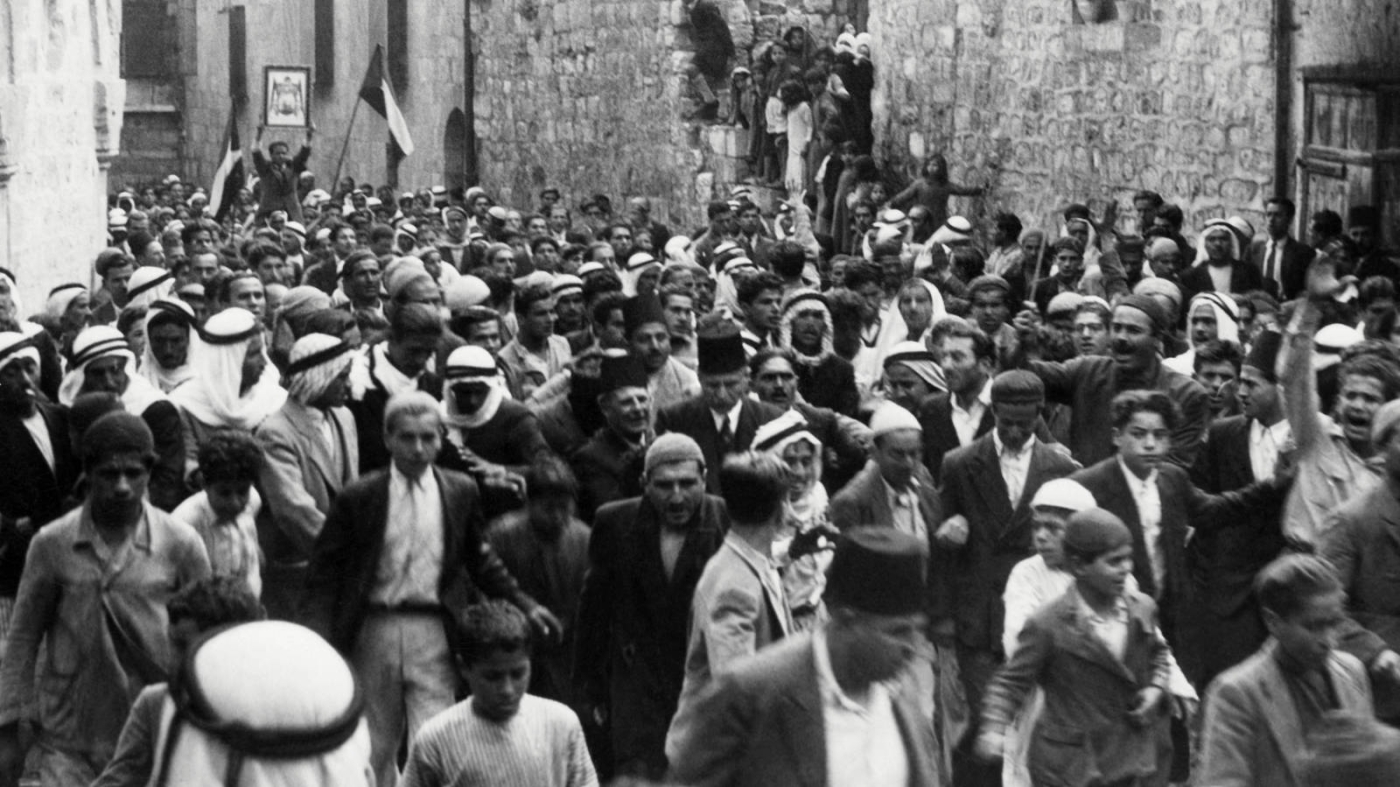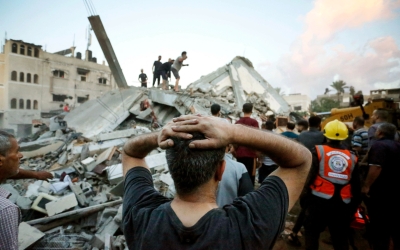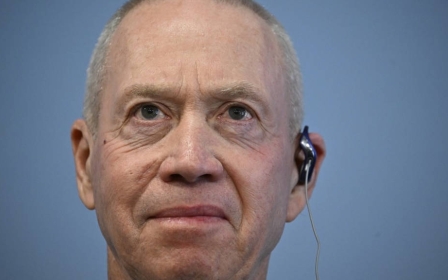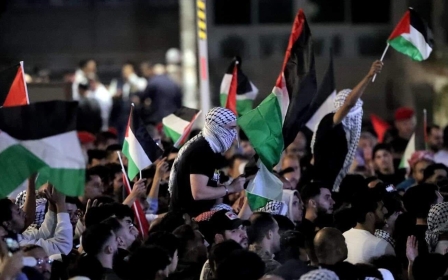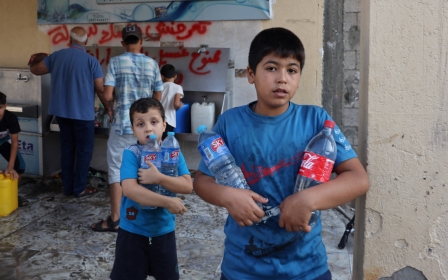Israel-Palestine war: Fear of 'second Nakba' if human corridor opened with Egypt
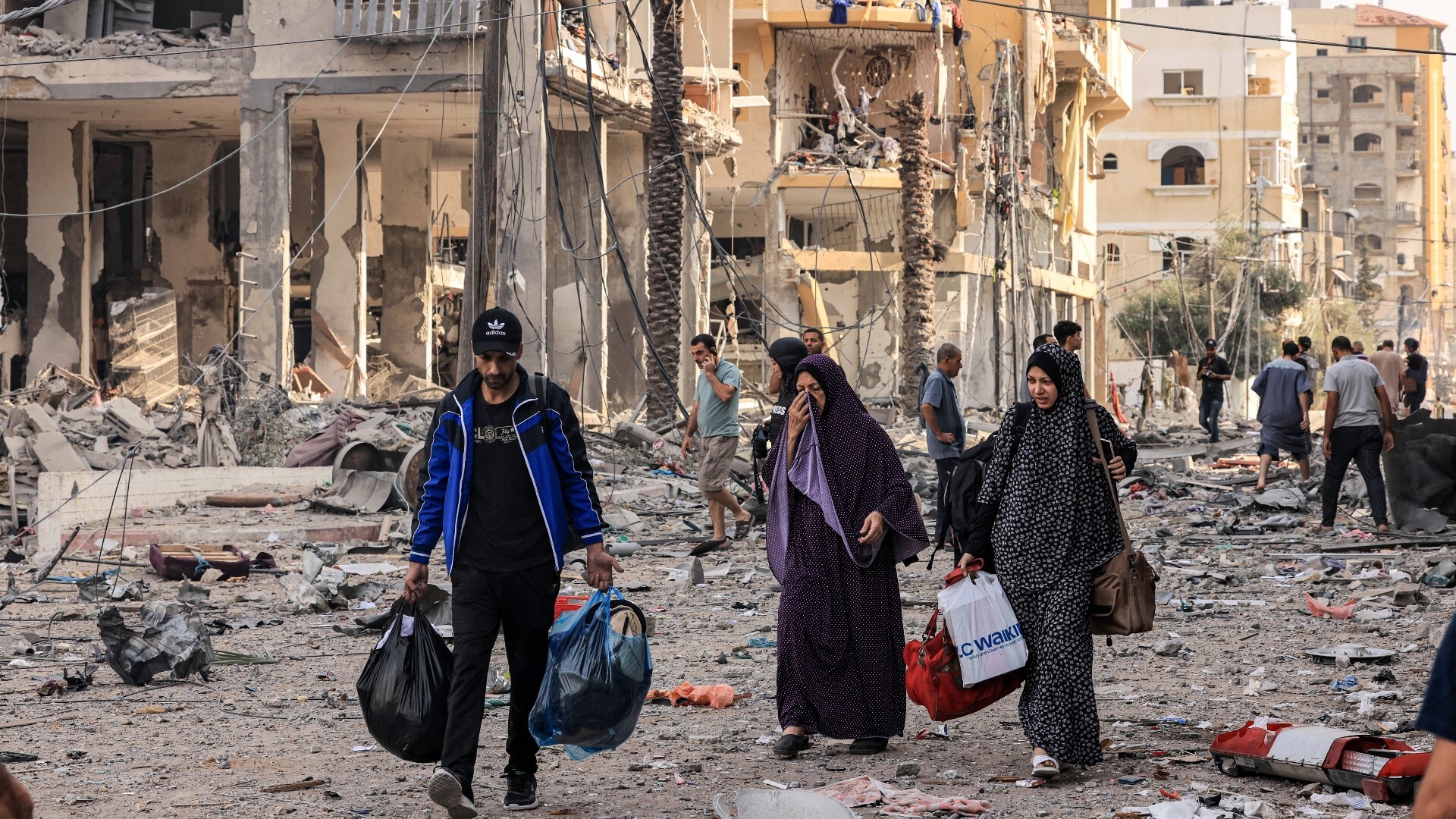
In response to Hamas's surprise attack over the weekend, Prime Minister Benjamin Netanyahu said Israel's response would "change the Middle East".
There are growing fears among Palestinians in Gaza that change could come in the form of a repeat of the Nakba, the mass Palestinian displacement of 1948, if thousands flee the besieged enclave and cross into Egypt.
Hamas launched a surprise multi-front assault on Israeli communities on Saturday, firing thousands of rockets and sending fighters into Israel across land, air, and sea. More than 1,300 Israelis have been killed, and around 130 people taken captive back to Gaza.
Israeli forces have responded by raining down a barrage of air strikes on the Gaza Strip this week, killing at least 1,350 people, most of them women and children.
Talk has ramped up this week of a humanitarian corridor being opened up between Egypt and Gaza, to allow for civilians to escape Israel’s relentless bombardment.
The Rafah border crossing between Egypt and Gaza - the only gateway in and out of the besieged enclave - was targeted by three separate Israeli strikes in the space of 24 hours earlier this week.
Palestinians in Gaza insist that Egyptian authorities must use the Rafah crossing to allow essential aid and resources to flow into Gaza, particularly after electricity and water were cut by Israeli authorities on Monday.
"Hospitals and in a very, very bad situation. Electricity and water plants in Gaza [have] stopped," Omar Shaban, a Gaza-based analyst and founder of PalThink for Strategic Studies, told MEE.
"There is no wifi. There is no food in the market. Prices getting high," he noted, adding that humanitarian assistance via Egypt was essential.
Egypt confirmed that while the bombings had caused damage to the crossing, it was not completely closed.
'It’s possible that desperate Gazans could cross the border regardless of whether Egypt permits it or not'
- Rex Brynen, McGill University
Washington has held talks with several countries over the idea of setting up such a passage for civilians. Cairo is actively helping to coordinate humanitarian aid through its border, but it has reportedly so far rejected setting up a corridor for refugees.
President Abdel Fattah el-Sisi said on Tuesday that there would be “no compromise or negligence of Egypt’s national security under any circumstances".
But Egyptian authorities know the situation is fluid, and have already begun logistical preparations for setting up tents in the Sinai cities of Sheikh Zuwayed and Rafah in the event of a mass exodus of Palestinians, according to a report in Mada Masr.
Citing government sources, the report adds that Palestinians would not be permitted to enter Arish, the largest city in the Sinai peninsula, and would be forced to stay within a 14km buffer zone.
What is the Nakba?
+ Show - HideThe Nakba is one of the key events in modern Middle East history and one that has come to define the Israeli-Palestinian conflict ever since.
Also known as "The Catastrophe", it began in late 1947 and 1948, as the new state of Israel came into existence.
Palestine was part of the Ottoman Empire for hundreds of years until it was captured by the UK at the end of World War One (1914-18).
The League of Nations - a forerunner of the UN - gave Britain a "mandate" over Palestine after the war, which did not take into account the wishes of the native Palestinian population.
The aim of such mandates was to bring about "the rendering of administrative assistance and advice" to native populations until they were deemed capable of standing alone as independent states.
What was the problem?
The British Mandate incorporated the Balfour Declaration, sent by Arthur Balfour, the British foreign secretary, to Lord Walter Rothschild, a prominent member of the British Jewish community, in 1917.
It pledged to establish "in Palestine a national home for the Jewish people", who made up less than 10 percent of the population at the time.
During the mandate years (1923-48), the UK facilitated the immigration of European Jews to Palestine, increasing their population 10-fold, from 60,000 in the pre-Mandate era to 700,000 by 1948.
They also trained, armed and supplied Zionist groups, and allowed them a degree of self-governance.
In contrast, the native Palestinian population, which rejected European Jewish immigration and called for independence, was violently suppressed.
The number of Jews arriving in Palestine from Europe and elsewhere increased in the wake of the Holocaust, which systemically targeted Jews and others, resulting in the deaths of more than 6m people.
In February 1947, Britain announced it would terminate the mandate and turn the question of Palestine over to the newly formed United Nations.
The UN adopted a partition plan in November 1947, which divided Palestine into two parts: 55 percent would form a Jewish state, while 45 percent would create an Arab state. Jerusalem would be kept under international control.
But many argue that the plan did not take into account populations at the time.
In addition, Jewish paramilitary groups produced a strategy to control the borders of the new territory, called Plan Dalet (below).
Some of their members would go on to become key Israeli leaders, including Yitzhak Rabin (prime minister 1992 - 1995), Ariel Sharon (prime minister 2001 - 2006) and Moshe Dayan (minister of defence 1967 - 1974).
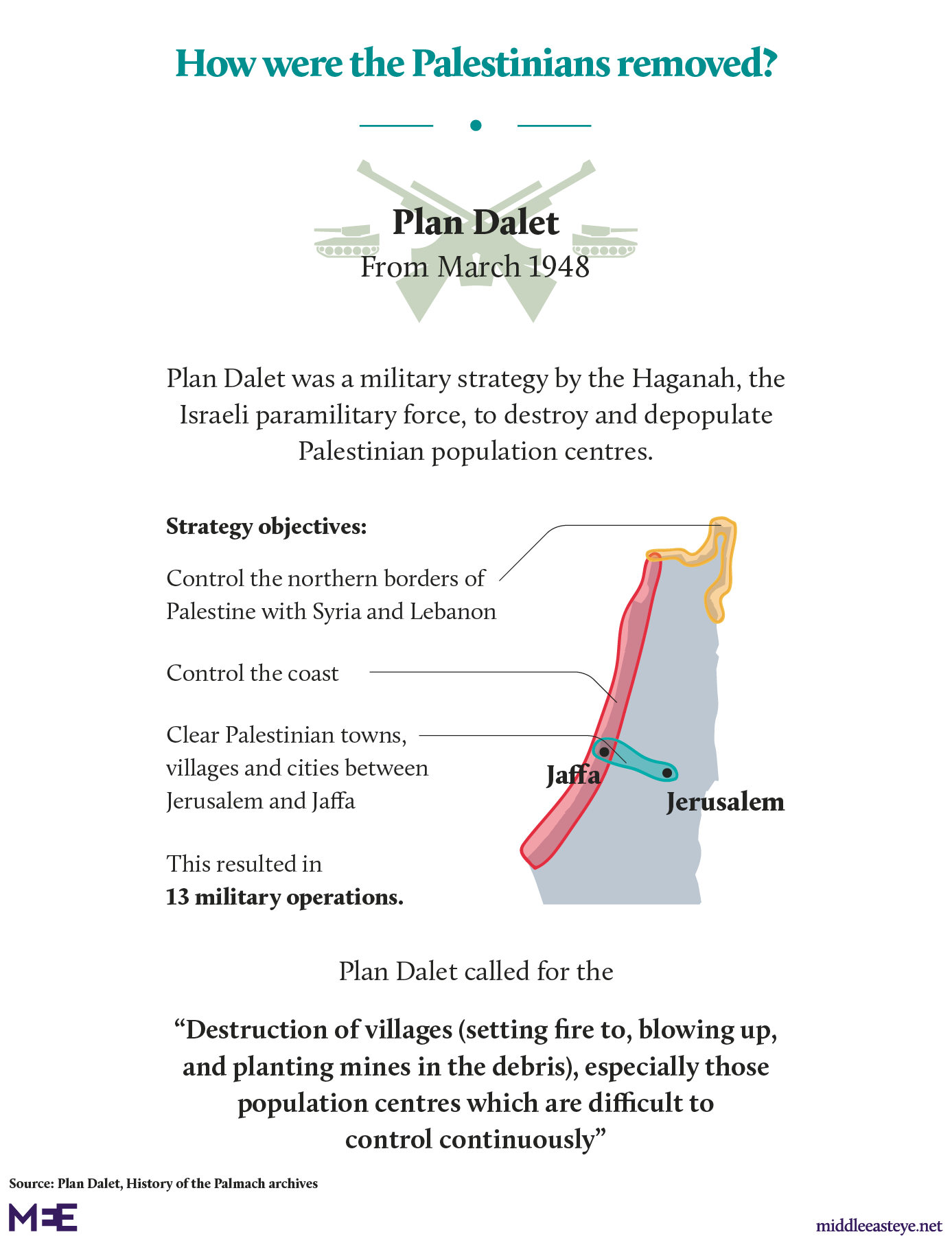
In the weeks and months that followed, thousands of Palestinians were killed or driven from their homes and communities uprooted by Jewish paramilitary groups.
Jews were also killed by Palestinian groups, if not in the same numbers.
On 14 May 1948, the State of Israel was unilaterally declared, a day before the British Mandate officially expired.
The new state had increased its share of historic Palestine from 55 percent to 78 percent. The remaining 22 percent was under Arab control.
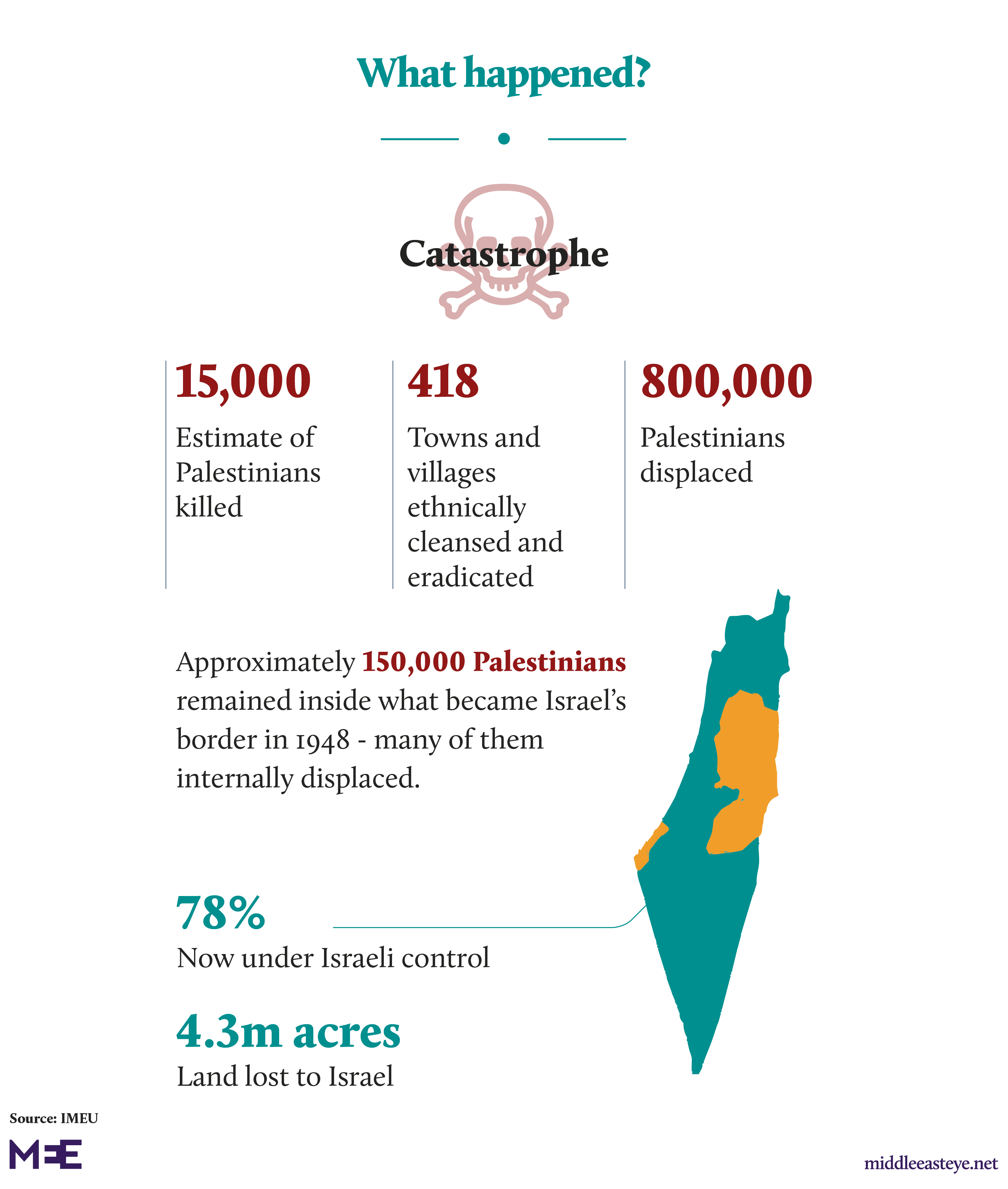
Many of the Palestinians who fled or were driven from their homes never returned to historic Palestine. Much of it is now the modern-day state of Israel.
More than 70 years later, millions of their descendants live in dozens of refugee camps in Gaza, the West Bank, and surrounding countries, including Jordan, Syria, and Lebanon.
Many still keep the keys to the homes that they and their families were forced to leave.
Nakba Day is now a key commemorative date in the Palestinian calendar. It is traditionally marked on 15 May, the date after Israeli independence was proclaimed in 1948.
Some Palestinians also observe it on the day of Israeli independence celebrations, which itself changes from year to year due to variations in the Hebrew calendar.
"It’s also possible that desperate Gazans could cross the border regardless of whether Egypt permits it or not," Rex Brynen, a professor at McGill University specialising in security in conflict areas, told Middle East Eye.
"Egyptian officials are already preparing for the possibility they may need to provide for refugees under this scenario."
But residents of Gaza - more than 60 percent of whom are already refugees from other parts of Palestine - are all too familiar with Israeli wars leading to their displacement, with little prospect of returning.
'Second Nakba'
The idea of Palestinians fleeing to Egypt was touted this week by an Israeli military figure. Right wing commentators have also used ultranationalist blogs to talk up the idea of illegal Israeli settlements in the Gaza Strip following a potential ground invasion.
“Palestinians are aware of this idea of some Israelis, to push Gaza into Sinai. They will not do it, they will not accept it,” said Shaban.
He said the idea was floated during previous Israeli wars on Gaza, and yet “people did not leave Gaza to Sinai”.
“They are not stupid. They don’t want to repeat the second Nakba,” Shaban added.
The Nakba, or catastrophe, was the ethnic cleansing of Palestine to make way for the creation of the state of Israel in 1948. At least 13,000 Palestinians were killed and hundreds of villages were destroyed.
Some 750,000 people were forcibly displaced from their homes - a figure which now stands at around six million Palestinian refugees, most of whom live in neighbouring countries.
In the Gaza war of early 2009, then-Egyptian Foreign Minister Ahmed Aboul Gheit refused to open the Rafah border crossing for Palestinian refugees.
“[Egypt] didn’t want a repeat of the Nakba, and they certainly didn’t want to bear the responsibility of it,” Muhammad Shehada, a journalist and rights activist from Gaza, told MEE.
Cairo appears to be similarly unwilling this time around, too.
On Wednesday, in a strongly worded statement condemning Israel and supporting Palestinian resistance, Egypt's Al Azhar, the Sunni Muslim world's most respected Islamic educational institution, said: "[Our] message to those who cling to their land is that it is better to die as knights and heroes on your land than to leave it as prey for the usurpers."
During the current war, the responsibility to open up a humanitarian corridor lay solely with Israel, as the occupying power, according to Shehada.
"[Israel must] allow for the transportation of severely wounded Palestinians who require medical treatment in the West Bank, for instance, because the occupied territories are one contiguous territorial unity under the Oslo Accords,” he said.
He added that under international law, Israel was obliged to protect the lives of civilians as much as it could within its capacity.
“Opening a humanitarian corridor is totally within its capacity,” he said.
'Nobody wants to live in Sinai tents'
Gaza was captured by Egypt during the 1948 war and was under Cairo's control until the 1967 Middle East war, when the territory was seized by Israel and occupied along with the West Bank and East Jerusalem.
In 2005, Israel purportedly pulled out of Gaza and relocated around 8,000 Jewish settlers and Israeli soldiers living in 21 settlements around Gaza to the occupied West Bank.
But in 2007, following the Hamas movement's election victory in Gaza, Israel responded by imposing an air, land, and sea blockade of the Gaza Strip. That siege has persisted for 16 years.
'The Palestinians who lived through wars and memories of the Nakba hope that it will not be repeated again'
- Ali Abdel-Wahab, Gaza-based researcher
Ali Abdel-Wahab, a data analyst and researcher who lives in besieged Gaza, is weighing up whether he would leave in the event of a humanitarian corridor opening up in the coming days.
He tells MEE that there are no shelters or safe areas in Gaza, with Israel bombing indiscriminately across the enclave.
“I will be logical, trying to challenge myself to stay and not let another catastrophe be repeated, but I have a family and they are my priority,” he said. “I constantly push this idea [of leaving] out of my head.”
He adds that even if a corridor were to open, it would be dangerous for those in the northern parts of the Gaza Strip to travel to the Rafah crossing, leaving them vulnerable to Israeli air strikes.
“I do not support the idea of there being resettlement in Sinai,” he said. “The Palestinians who lived through wars and memories of the Nakba hope that it will not be repeated again.”
Shehada concurs with that sentiment.
“Nobody in Gaza wants to live as a refugee in tents in the Sinai Desert,” he said. “That’s basically the plan of the Israeli far-right.”
Despite the Israeli blockade and living through five brutal wars since 2008, most in Gaza have no desire to leave.
As one Gaza resident said in a viral clip on Thursday: "Do they think we want to emigrate to Egypt? No way. This time, we're going to our occupied land, to Jerusalem."
Middle East Eye propose une couverture et une analyse indépendantes et incomparables du Moyen-Orient, de l’Afrique du Nord et d’autres régions du monde. Pour en savoir plus sur la reprise de ce contenu et les frais qui s’appliquent, veuillez remplir ce formulaire [en anglais]. Pour en savoir plus sur MEE, cliquez ici [en anglais].


